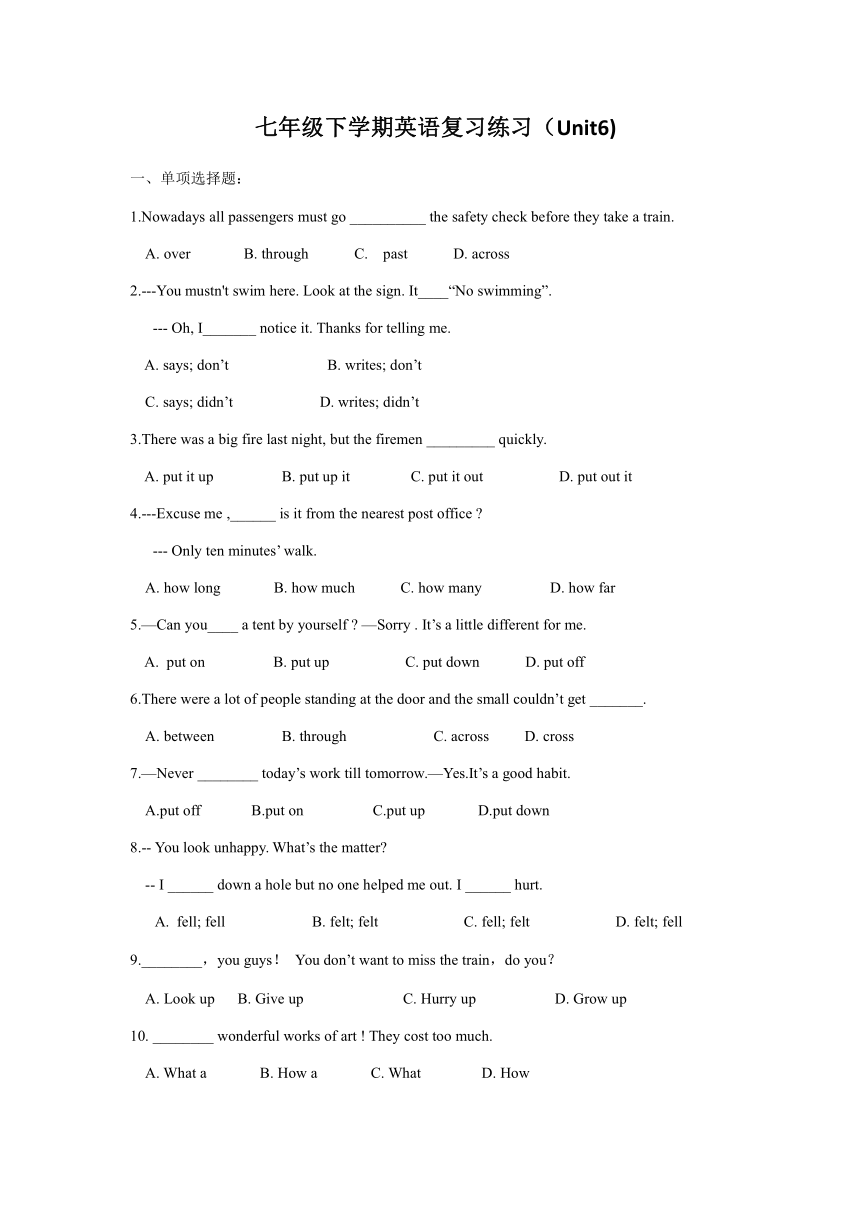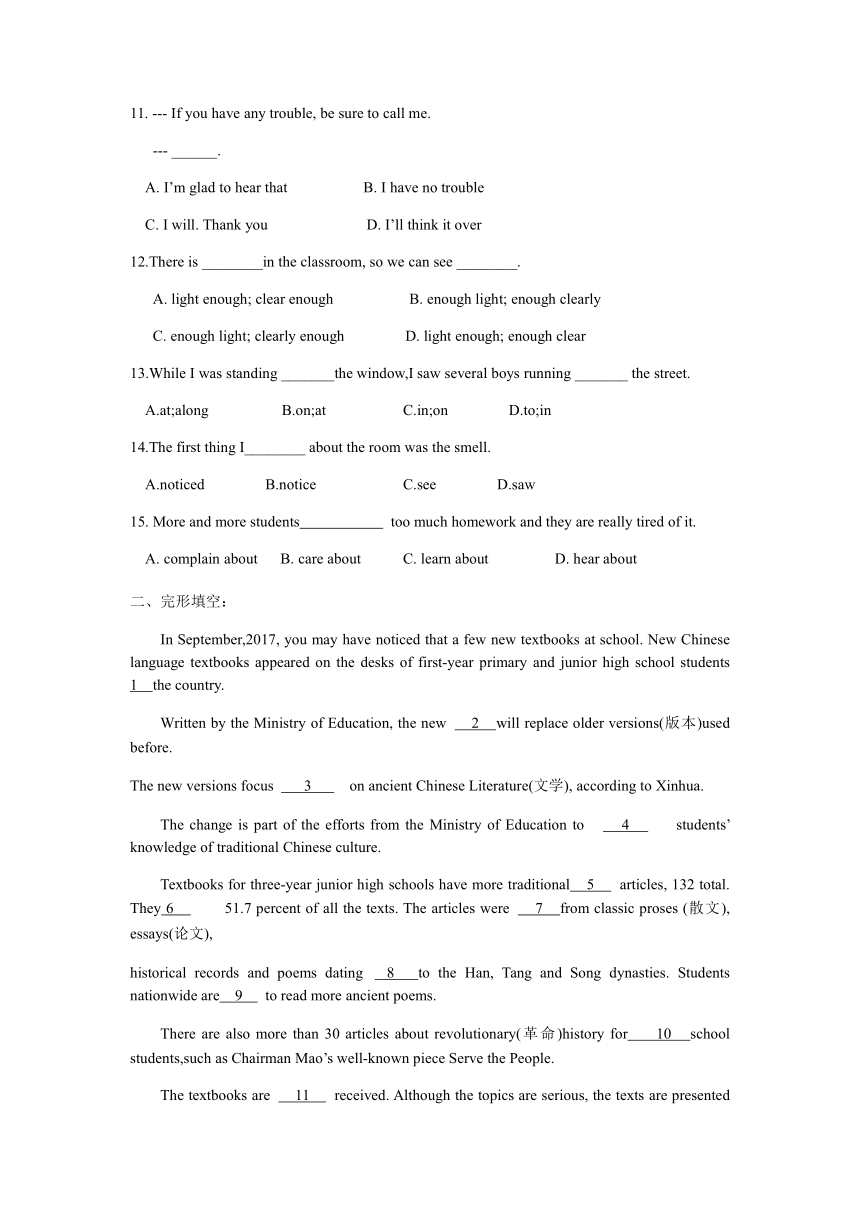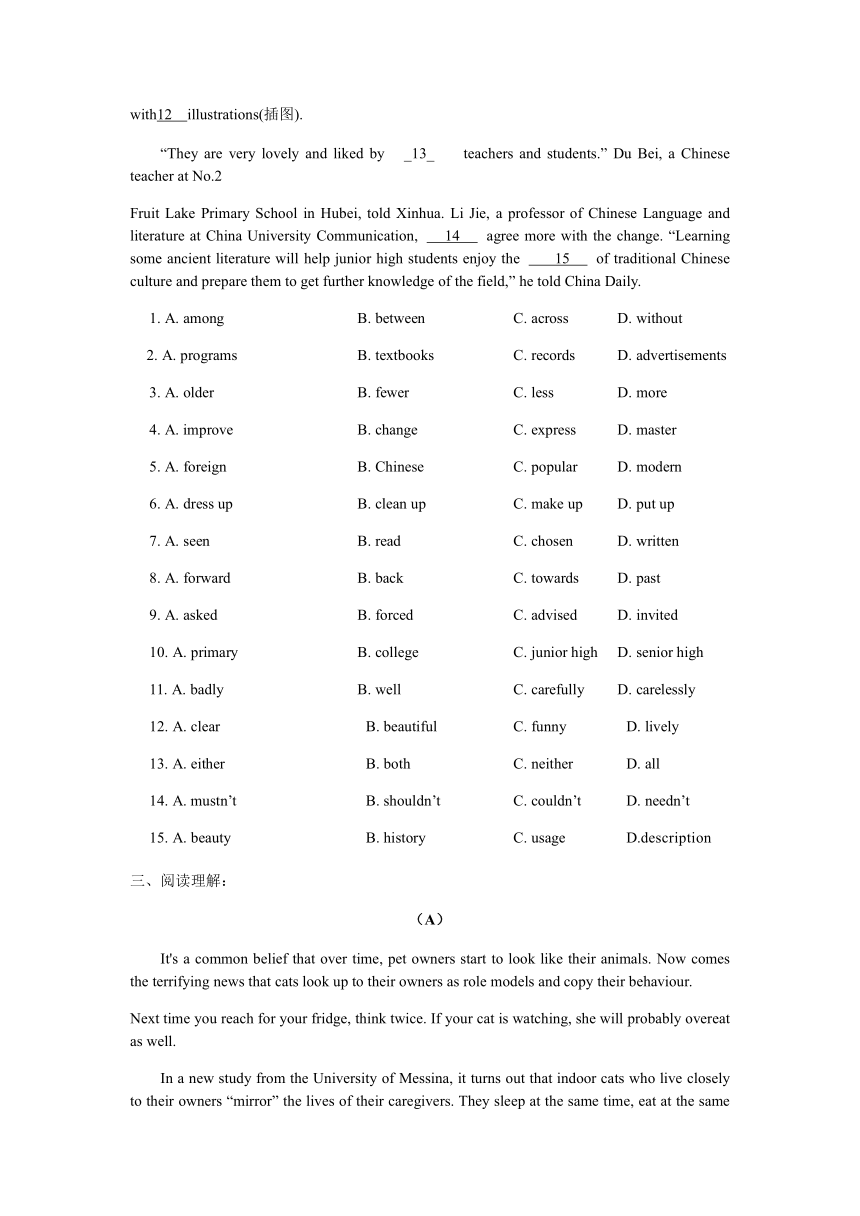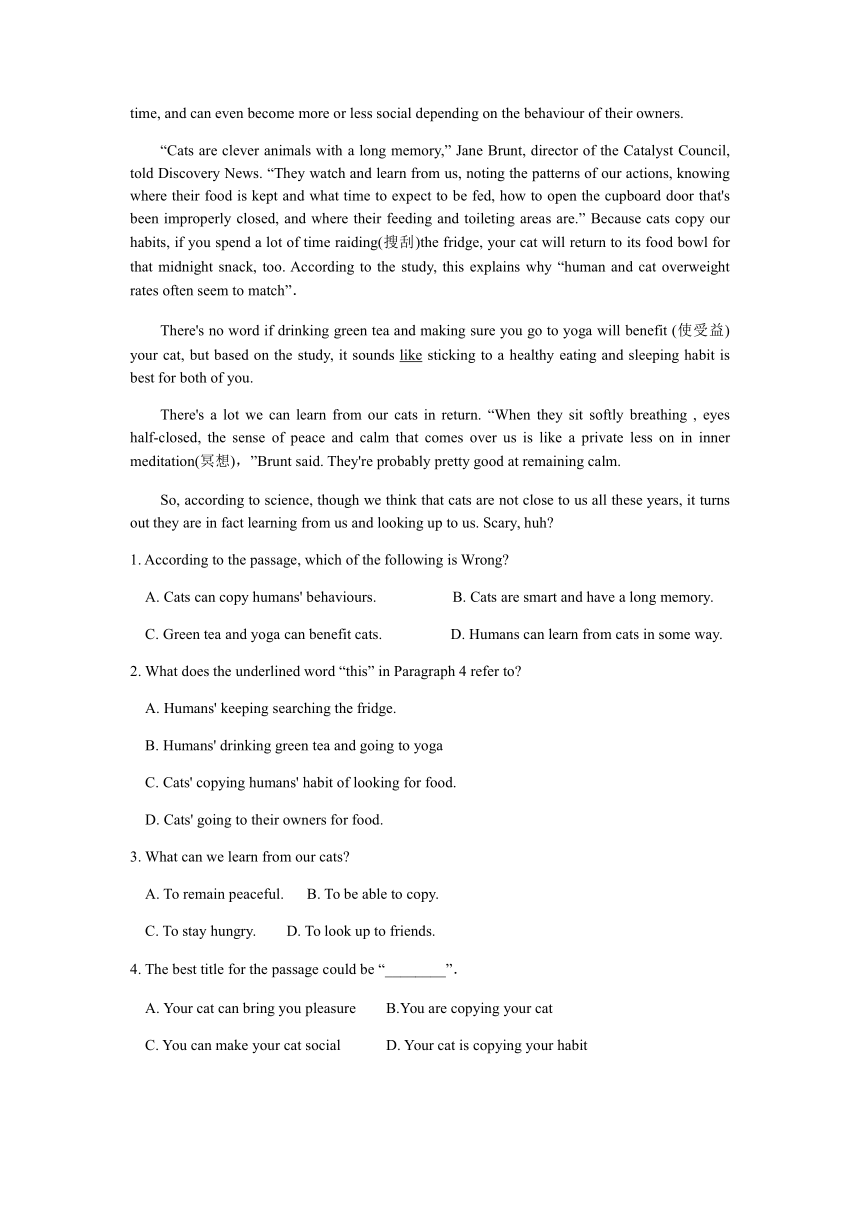牛津译林版七年级下学期英语复习练习Unit 6 Outdoor fun(有答案)
文档属性
| 名称 | 牛津译林版七年级下学期英语复习练习Unit 6 Outdoor fun(有答案) |  | |
| 格式 | zip | ||
| 文件大小 | 74.5KB | ||
| 资源类型 | 教案 | ||
| 版本资源 | 牛津译林版 | ||
| 科目 | 英语 | ||
| 更新时间 | 2020-04-09 21:24:08 | ||
图片预览




文档简介
七年级下学期英语复习练习(Unit6)
一、单项选择题:
1.Nowadays all passengers must go __________ the safety check before they take a train.
A. over B. through C. past D. across
2.---You mustn't swim here. Look at the sign. It____“No swimming”.
--- Oh, I_______ notice it. Thanks for telling me.
A. says; don’t B. writes; don’t
C. says; didn’t D. writes; didn’t
3.There was a big fire last night, but the firemen _________ quickly.
A. put it up B. put up it C. put it out D. put out it
4.---Excuse me ,______ is it from the nearest post office ?
--- Only ten minutes’ walk.
A. how long B. how much C. how many D. how far
5.—Can you____ a tent by yourself ? —Sorry . It’s a little different for me.
A. put on B. put up C. put down D. put off
6.There were a lot of people standing at the door and the small couldn’t get _______.
A. between B. through C. across D. cross
7.—Never ________ today’s work till tomorrow.—Yes.It’s a good habit.
A.put off B.put on C.put up D.put down
8.-- You look unhappy. What’s the matter?
-- I ______ down a hole but no one helped me out. I ______ hurt.
A. fell; fell B. felt; felt C. fell; felt D. felt; fell
9.________,you guys! You don’t want to miss the train,do you?
A. Look up B. Give up C. Hurry up D. Grow up
10. ________ wonderful works of art ! They cost too much.
A. What a B. How a C. What D. How
11. --- If you have any trouble, be sure to call me.
--- ______.
A. I’m glad to hear that B. I have no trouble
C. I will. Thank you D. I’ll think it over
12.There is ________in the classroom, so we can see ________.
A. light enough; clear enough B. enough light; enough clearly
C. enough light; clearly enough D. light enough; enough clear
13.While I was standing _______the window,I saw several boys running _______ the street.
A.at;along B.on;at C.in;on D.to;in
14.The first thing I________ about the room was the smell.
A.noticed B.notice C.see D.saw
15. More and more students too much homework and they are really tired of it.
A. complain about B. care about C. learn about D. hear about
二、完形填空:
In September,2017, you may have noticed that a few new textbooks at school. New Chinese language textbooks appeared on the desks of first-year primary and junior high school students 1 the country.
Written by the Ministry of Education, the new 2 will replace older versions(版本)used before.
The new versions focus 3 on ancient Chinese Literature(文学), according to Xinhua.
The change is part of the efforts from the Ministry of Education to 4 students’ knowledge of traditional Chinese culture.
Textbooks for three-year junior high schools have more traditional 5 articles, 132 total. They 6 51.7 percent of all the texts. The articles were 7 from classic proses (散文), essays(论文),
historical records and poems dating 8 to the Han, Tang and Song dynasties. Students nationwide are 9 to read more ancient poems.
There are also more than 30 articles about revolutionary(革命)history for 10 school students,such as Chairman Mao’s well-known piece Serve the People.
The textbooks are 11 received. Although the topics are serious, the texts are presented with12 illustrations(插图).
“They are very lovely and liked by _13_ teachers and students.” Du Bei, a Chinese teacher at No.2
Fruit Lake Primary School in Hubei, told Xinhua. Li Jie, a professor of Chinese Language and literature at China University Communication, 14 agree more with the change. “Learning some ancient literature will help junior high students enjoy the 15 of traditional Chinese culture and prepare them to get further knowledge of the field,” he told China Daily.
1.?A.?among B. between C. across D.?without
2.?A.?programs B. textbooks C. records D.?advertisements
3.?A.?older B. fewer C. less D.?more
4.?A. improve B. change C. express D.?master
5.?A.?foreign B. Chinese C. popular D.?modern
6.?A.?dress?up B. clean?up C. make?up D.?put?up
7.?A.?seen B. read C. chosen D.?written
8.?A.?forward B. back C. towards D.?past
9.?A.?asked B. forced C. advised D.?invited
10.?A.?primary B. college C. junior?high D.?senior?high
11.?A.?badly B. well C. carefully D.?carelessly
12.?A.?clear B. beautiful C. funny D.?lively?
13.?A.?either B. both C. neither D.?all
14.?A. mustn’t B. shouldn’t C. couldn’t D.?needn’t
15.?A.?beauty B. history C. usage D.description
三、阅读理解:
(A)
It's a common belief that over time, pet owners start to look like their animals. Now comes the terrifying news that cats look up to their owners as role models and copy their behaviour.
Next time you reach for your fridge, think twice. If your cat is watching, she will probably overeat as well.
In a new study from the University of Messina, it turns out that indoor cats who live closely to their owners “mirror” the lives of their caregivers. They sleep at the same time, eat at the same time, and can even become more or less social depending on the behaviour of their owners.
“Cats are clever animals with a long memory,” Jane Brunt, director of the Catalyst Council, told Discovery News. “They watch and learn from us, noting the patterns of our actions, knowing where their food is kept and what time to expect to be fed, how to open the cupboard door that's been improperly closed, and where their feeding and toileting areas are.” Because cats copy our habits, if you spend a lot of time raiding(搜刮)the fridge, your cat will return to its food bowl for that midnight snack, too. According to the study, this explains why “human and cat overweight rates often seem to match”.
There's no word if drinking green tea and making sure you go to yoga will benefit (使受益) your cat, but based on the study, it sounds like sticking to a healthy eating and sleeping habit is best for both of you.
There's a lot we can learn from our cats in return. “When they sit softly breathing , eyes half-closed, the sense of peace and calm that comes over us is like a private less on in inner meditation(冥想),”Brunt said. They're probably pretty good at remaining calm.
So, according to science, though we think that cats are not close to us all these years, it turns out they are in fact learning from us and looking up to us. Scary, huh?
1. According to the passage, which of the following is Wrong?
A. Cats can copy humans' behaviours. B. Cats are smart and have a long memory.
C. Green tea and yoga can benefit cats. D. Humans can learn from cats in some way.
2. What does the underlined word “this” in Paragraph 4 refer to?
A. Humans' keeping searching the fridge.
B. Humans' drinking green tea and going to yoga
C. Cats' copying humans' habit of looking for food.
D. Cats' going to their owners for food.
3. What can we learn from our cats?
A. To remain peaceful. B. To be able to copy.
C. To stay hungry. D. To look up to friends.
4. The best title for the passage could be “________”.
A. Your cat can bring you pleasure B.You are copying your cat
C. You can make your cat social D. Your cat is copying your habit
(B )
Early one morning, more than a hundred years ago, an American inventor called Elias Howe finally fell asleep. He had been working all night on the design of a sewing machine but he had run into a very difficult problem: It seemed impossible to get the thread to run smoothly around the needle. Though he was tired, Howe slept badly. He turned and turned. Then he had a dream. He dreamed that he had been caught by terrible savages whose king wanted to kill him and eat him unless he could build a perfect sewing machine. When he tried to do so, Howe ran into the same problem as before. The thread kept getting caught around the needle. The king flew into the cage and ordered his soldiers to kill Howe. They came up towards him with their spears(矛) raised. But suddenly the inventor noticed something. There was a hole in the tip of each spear. The inventor awoke from the dream, realizing that he had just found the answer to the problem. Instead of trying to get the thread to run around the needle, he should make it run through a small hole in the center of the needle. This was the simple idea that finally made Howe design and build the first really practised sewing machine.
Elias Howe was not the only one in finding the answer to his problem in this way. Thomas Edison, the inventor of the electric light, said his best ideas came into him in dreams. So did the great physicist Albert Einstein. Charlotte Bronte also drew in her dreams in writing Jane Eyre.
To know the value of dreams, you have to understand what happens when you are asleep. Even then, a part of your mind is still working. This unconscious(无意识的), but still active part understands your experiences and goes to work on the problems you have had during the day. It stores all sorts of information that you may have forgotten or never have really noticed. It is only when you fall asleep that this part of the brain can send messages to the part you use when you are awake. However, the unconscious part acts in a special way. It uses strange images which the conscious part may not understand at first. This is why dreams are sometimes called “secret messages to ourselves”.
5.According to the passage, Elias Howe was________.
A. the first person we know of who solved problems in his sleep
B. much more hard-working than other inventors
C. the first person to design a sewing machine that really worked
D. the only person at the time who knew the value of dreams
6.The problem Howe was trying to solve was________.
A. what kind of thread to use
B. how to design a needle which would not break
C. where to put the needle
D. how to prevent the thread from getting caught around the needle
7.Thomas Edison is spoken of because________.
A. he also tried to invent a sewing machine B. he got some of his ideas from dreams
C. he was one of Howe’s best friends D. he also had difficulty in falling asleep
8.Dreams are sometimes called“secret messages to ourselves” because___.
A. strange images are used to communicate ideas
B. images which have no meaning are used
C. we can never understand the real meaning
D. only specially trained people can understand them
四、词汇运用:
1. You should keep the water clean at ________ (little)
2. We all think China has the ______(able) to solve(解决) the problems in the South China Sea
3. _________(lucky), he can’t find his lost knife.
4.Tom is the_________ (49) to get to school.
5. You should knock on the door before ____________(进入)the teacher's office.
6. My father _______ himself English when he was young.(teach)
7. Chinese made the first kite ______________(世纪) ago.
8. She always does her homework ______ (小心),and we don’t like working with her.
9. I went to his house, but the door was ___________. (lock)
10.Last week, he_______(fall) off his bike and hurt his arm.
五、翻译句子:
1.去年我的表弟太忙了没有练习拉小提琴。
_________________________________________________________________
2.我们都在期盼着能在聚会上看见你。
_________________________________________________________________
3.她说她不再害怕动物了。
_________________________________________________________________
4.老师告诉我们不要把热的东西放到垃圾箱里。
_________________________________________________________________
5.当他醒过来时,他发现自己一个人在河边。
_________________________________________________________________
六、根据短文内容和首字母提示完成短文
It was a dark and cold night. The taxi driver didn't have even one passenger all day. When he went b 1 the railway station, he saw a young man coming out w 2 two bags in his hands, so he q 3 opened the door of the car and asked, "Where do you want to go, sir?"
“To the Star Hotel," the young man answered. When the taxi driver heard that, he didn't feel h 4 any more. He knew the young man would give him o 5 three dollars because the hotel was not f 6 from the railway station But suddenly, he had an idea. He took the passenger through many streets of the big city.
After a long t 7 ,the car arrived at the hotel. "You should pay me fifteen dollars," the car driver said to the young man "What? Fifteen dollars! Do you think I'm a fool? Only last week I took a taxi from the railway station to the s 8 hotel and I only gave the driver thirteen dollars. I know how m 9 I have to pay for the trip. I won't pay you one dollar m 10 than I paid to the taxi driver last week."
1. _______ 2. _______ 3. _______ 4. _______ 5._______
6 _______ 7. _______ 8. _______ 9. _______ 10.?_______
七、书面表达:
同学们一定对《爱丽丝漫游仙境》很感兴趣。请按下面的要点续写下面的故事吧!
1.吃完写有“吃我”的蛋糕后,她越长越大,头顶都碰到屋顶(roof)了。
2.爱丽丝拿到了钥匙,但她却不能变小了。她出不去,伤心地哭了,眼泪(tear)都流成了池子(pool)。
3.白兔先生来了,丢下(drop)了一副手套和一把扇子就跑走了。
4.在池子里,她遇到了一只小老鼠。在小老鼠的帮助下,爱丽丝离开了那个大厅。
要求:1. 按上面的要点提示续写,注意文章的时态。
2. 分段落描写,书写清晰、工整 3. 字数在50词以上。
More of Alice in Wonderland
七年级下学期英语复习练习(Unit6)答案
一、单项选择题:
1-5 BCCDB 6-10 BACCC 11-15 ACAAA
二、完形填空:
1-5?CBDAB????6-10?CCBAC???11-15?BDBCA
三、阅读理解:
A) 1-4 DCAD B) 5-8 CDBA
四、词汇运用:
1. least 2. ability 3. Unluckily 4. forty-ninth 5. entering
6. taught 7. centuries 8. carefully 9. locked 10. fell
五、翻译句子:
1. My cousin was too busy to practice playing the violin last year.
2. We are all looking forward to seeing you at the party.
3. She said she was no longer afraid of animals.
4. The teacher told us not to put the hot stuff in the dustbin.
5. When he woke up, he found himself alone by the river.
六、选词填空
1. by 2. with 3. quickly 4. happy 5. only 6. far 7. time 8. same 9. much 10. more
七、书面表达:
略。
